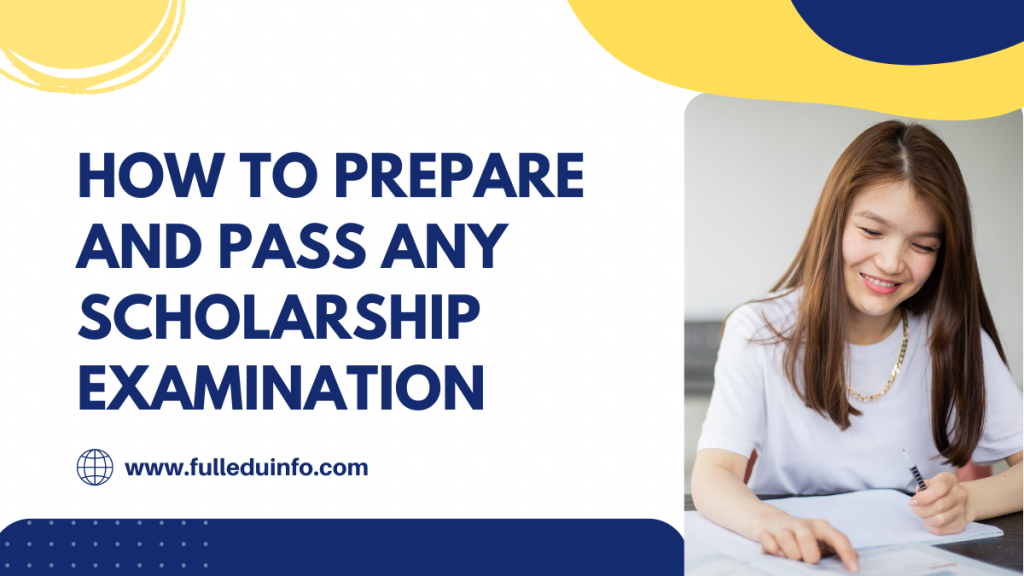Studying with a Scholarship nowadays does not have to do with excellent academic performance. Many average students have been offered scholarships to study abroad, fulfilling the necessary criteria. This is to say that over 50% of students are offered scholarships. Several universities and organizations provide scholarships using other metrics, and applicants must write and pass the scholarship exam to qualify. This article will give you top scholarship exam preparation tips.
Online scholarship exams are standard because most applicants are not citizens of the country they applied for. Most individuals assume that reading is all required to prepare for any examination, including scholarship examinations.
10 Surest Tips For Successful Exam Preparation
Although reading is an essential tip in preparing for your scholarship exam, that’s not all. You would need to do more than just reading to pass any exam. The following are the top 10 scholarship exam preparation tips to consider while preparing for a scholarship exam.

1. Familiarize Yourself With the Scholarship Sponsor or Organizer
The first tip is to know the sponsor, the organization, or the university in charge of the scholarship. Understand the aim, history, vision, and mission of the organization. You might have one or two questions on this during your exam. Apart from that, knowing the scholarship sponsor will enable you to make better decisions. You can visit the official website to gather relevant information.
2. Understand the Scholarship Exam
Taking the exam is pointless if you don’t know how it’ll be structured. Before you begin any preparation, you must first understand the exam pattern and syllabus in depth so that your hard work for exam preparation leads to success. You must have an understanding of the subjects included in the exam. Apart from knowing the subjects, you will take the exam. You also need to know the areas to focus on.
Knowing all of the topics is essential. If you don’t, you could miss out on some of the issues you must prepare. You also need to know the exam date, which will help you plan and study time. Lastly, know the mode of exam and grading system
3. Have an Organized Study Space
Another tip on scholarship exam preparation is to stay organized, give yourself enough time to study and be deliberate about it, and prepare a study guide to cover the key areas and familiarize yourself with the likely questions. You don’t want to overwhelm yourself, especially if you have been out of school for a while. You might need to be strict with yourself, so get the necessary study material and follow your study guide.
4. Practice With Past Questions
One of the most important things you need to do is focus on studying previous questions for at least three weeks before the exam. This does not mean those questions are what you should expect; practice more on the areas from which the questions are picked. This is beneficial since, in most cases, question patterns from the previous years are repeated, and to make this highly successful, you must go back a few years. Look for relevant answers to the questions. You can seek professional assistance if necessary. Note: You are not expected to skim through the contents or read at random; your reading should be in-depth. This strategy is well thought out.
5. Study, Don’t Cram
The next tip on scholarship exam preparation is to study and not cram. There is a huge difference between cramming and studying. Cramming is the technique practiced by students hours or days before an exam, in which they work hard to absorb large quantities of knowledge in a short period, to write it out exactly as it was crammed. This is not advisable.
Studies show that camming raises students’ stress levels and causes tension, making exam preparation more difficult and time-consuming. When you study, you read to understand. There are three types of memory structures that work together when you study; sensory memory, working memory, and long-term memory. If you study, you are using these memory structures effectively, which helps in the sense that you can even explain what you’ve read to someone in your own words or another language.
6. Practice Daily
Practicing daily, if not every day, then every two days to help you. This might not be easy, but make sure you learn something new every day. If you can’t keep up, revisit what you learned yesterday and revise for about 20 minutes before you continue other activities. Scholarship exam practice tests may be available depending on the sponsors.
7. Stay Positive
Another tip on scholarship exam preparation is to stay positive. Your thoughts can affect your overall output, especially before your scholarship exams, so try as much as possible to maintain an optimistic spirit. After your exam, you need to stay the same. Staying calm and positive will give you the energy to apply for other scholarships.
8. Sleep Well
According to the Dalai Lama, “Sleep is the best meditation.” Sleeping helps to relax your brain and your mind and helps to reduce stress. Having a sound sleep helps one to think critically. It is not advisable to stay up all night studying before your exam.
Allow for no more than eight hours of sleep. An adult should sleep for at least seven hours every night, and most people do not require more than eight hours of sleep to attain this aim. It was discovered by some researchers that students who slept longer hours performed better than those who used the time meant for rest to study. Most of the time, some students find that depriving themselves of good sleep to study for an exam does not result in a higher score. Most of the time, it’s not how far but how well. In other words, sleep deprivation might lead to poor academic performance.
9. Take Healthy Food and Fruits
Always remember to eat and take fruits to boost your brain performance. Eating healthy is another scholarship exam preparation tip. Taking oranges, eggs, berries, turmeric, dark chocolate, and Green tea can help boost your memory. You can’t possibly study well on an empty stomach, so eating on time is a pro tip.
10. Exercise and Revision
Lastly, our scholarship exam preparation tip is exercise and revision. About 3-5 days before your exam or the week of your exam, ensure you start going over everything you’ve studied. Revision helps you refresh your memory of what you’ve read, enabling you to retain vital information in your long-term memory, as discussed earlier.
With the help of long-term memory, you can store information over a long period. Long-term memory takes practice and repetition to become permanent, and once stored, knowledge may remain for an extended period and be remembered by triggers or signals. This memory is usually steady and can continue for a long time.
Necessary Tips to Pass Your Exam
Develop the Right Mindset:Developing the right mindset before and during your application is vital to passing your exam. Most people who apply for scholarships do not make it past the application stage because they do not have the right reason and motivation. They apply because they do not want to feel left out when their friends apply, not because they want it or feel they can obtain it. This is a bad attitude since they would not take the scholarship seriously.
Start Studying Early: Studying early will allow you to cover many study areas, increasing your chances of passing your scholarship exams. This also means you will have enough time to review what you have read.
Study Current Affairs: Another important tip is to study current affairs, and you should also do more research to understand the history of the organization sponsoring the scholarship. General questions would likely come from there.
Be Confident: The last necessary tip to pass your exam is to be confident in your abilities. Most candidates are usually tensed, especially if they are writing the exam for the first time. Mental stability should not be ignored. It will help you to build confidence in what you have studied. It is possible to forget what you studied because you are not calm and collected..
Common Scholarship Exam Areas
A scholarship is different from a conventional school exam in which pupils are asked to demonstrate their knowledge of a few recently reviewed topics, i.e., what they have learned in class. Scholarship tests instead focus on testing applicants’ general knowledge, intellectual soundness, and ability to apply that information in various contexts, including current events, verbal reasoning, quantitative reasoning, sciences, and many other facets of learning.
There are five essential areas of scholarship exams. While you can get a sample of scholarship exam questions online, most scholarships do not have a past question; be careful not to pay for any scholarship past questions. Although you may come across scholarship exam questions and answers pdf, it may not apply to the scholarship you applied for.
The scholarship exam will be based on one or two of the following:
- Numerical Reasoning and Mathematics
- Verbal Reasoning, Essay Writing, Spoken English Skills
- Reading Comprehension
- Abstract Reasoning
- Science
Mistakes to Avoid During Your Scholarship Preparation Exam
Studying For a Long Time
One of the common mistakes people make is studying for a long time, and you must avoid this. Study smart by creating a timetable; binge studying is not a wise thing to do. If you don’t lose concentration, you might find it difficult to remember what you have read. So, avoid studying for a long time.
Procrastination
Next is procrastination, the thief of time. This is one of the reasons why you need a study guide. Studying for your scholarship exam is not something to be spontaneous about, and you need to be diligent and keep to your study time. Do not procrastinate.
Studying on the Bed
Another mistake you should avoid is studying on the bed, getting a table and chair, and making a study space. It’s good to be comfortable while studying, but sitting on your bed to study is a bad idea. You have a high chance of laying down, slouching, or falling asleep.
Keeping Your Phone Close to You
This is another mistake you must avoid, keep your phone on silent or do not disturb when it’s time to study for your scholarship exams. Phones are a huge distraction, and you might find it hard to stay focused, especially when the notification is on. Your 2 minutes break to respond to that message may cost you hours if you are not careful.
Studying/ Cramming at the Last Hour Before Your Exam
Last but not least, avoid last-minute cramming. Doing this can ruin everything, and you might find it difficult to remember what you have studied in the exam hall. If you could not cover the necessary areas, rushing over it won’t be of much help, so don’t be too pressured or stressed.
Final Conclusion
There you have it, the top 10 scholarship exam preparation tips. These tips will help you stay focused, and you can also refer to them when you prepare for any other exam. While you follow these top 10 tips closely, ensure you abide by all the rules and regulations expected of you while writing your exams. I wish you all the best.








